Living In Thailand Blog
Tuesday 8th May 2007
My life in Thailand seems to have hit a real sweet spot recently. I've been busier than I've ever been here but you only get out of life what you put in and if you are lazy and don't put anything in, you don't get anything back. I'm certainly not complaining but the busy period has meant I've had to put a few things on hold.
A couple of people have sent e-mails requesting more Thai language related items. This is something I enjoy enormously and I will start making an effort to get back on track with language stuff. My own Thai studies have been neglected recently and so far I have failed with my target of adding 10 new words to my Thai vocabulary each week.
Back in March I looked at some signs advertising vacant rooms for rent. I will continue with some more signs because a) It's useful knowing what they say and b) Reading them is easy!
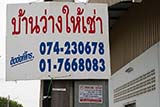 The jump from signs and menus to books and newspapers is a big one that I haven't made yet so I will stick with what I know.
The jump from signs and menus to books and newspapers is a big one that I haven't made yet so I will stick with what I know.
Yesterday, I took a walk around the local neighbourhood looking for suitable signs. I was actually surprised at how much I could read and understand. As before, these are real signs some of which I've cleaned up in Photoshop.
Three years ago I couldn't read anything and if I can learn how to read Thai, anyone can. I'm not the brightest of people or the fastest learner and I have a brain like a sieve.
The first sign we will look at today is similar to the ones I covered in March about rooms for rent but the first word is different. Instead of
ห้องว่าง it says บ้านว่าง
บ is a 'B' sound at the beginning of a syllable and a 'P' sound at the end. It has a tone mark above it (which we will ignore for the moment) and the next letter า is a vowel. It's a long 'AA' or 'AR'.
After this comes น which is an 'N' sound regardless of where it comes. The word is baan which is Thai for house. If you are looking to rent a house rather than a room, this is what you need to look for.
Returning to that tone mark 'mai toh', the initial consonant is mid class so the tone with baan is falling. For the rest of the sign (baan waang hai chao), refer to my blog for March, because it's exactly the same.
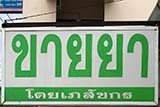 We've talked about renting rooms and houses but what if you want to buy something? First, you need to find someone who is selling. The Thai verb 'to sell' is ขาย as seen in this sign.
We've talked about renting rooms and houses but what if you want to buy something? First, you need to find someone who is selling. The Thai verb 'to sell' is ขาย as seen in this sign.
The first letter ข is a 'K' sound followed by the long 'AA' we have already covered. The next letter ย is a 'Y' sound so it says 'KAAY' which is often transliterated to a short 'KAI' but that's really an egg (or slang for a penis).
But what's being sold here? It couldn't be easier because the next word consists only of two letters, both of which are used in the first word. First is a 'Y' and then a long 'AA' spelling 'yaa' which is a generic Thai word for drugs or medicine. It says 'sell drugs'.
 You will see these signs absolutely everywhere in Thailand outside pharmacies.
You will see these signs absolutely everywhere in Thailand outside pharmacies.
Occasionally, you might see a slight variation on the same theme. In this sign you can see the 'YAA' part and good students among you will notice than the first word is similar to the one we covered a few minutes ago (baan) apart from the fact the first letter is different.
The first letter ร is an 'R' sound at the beginning of a syllable and an 'N' sound at the end. You should have worked out already that it rhymes with baan, so the word is raan which is Thai for shop.
This sign is also for a pharmacy (raan yaa), or to be more precise, a medicine shop. The word order in Thai is noun-adjective (shop medicine) rather than adjective-noun (medicine shop) as in English. Like the word for baan it uses the same tone mark 'mai toh' but บ is a mid class consonant whereas ร is low class.
With a low class consonant and the mai toh tone mark the tone is high so raan must be spoken with a high tone. Don't get confused between consonant classes (low, mid, high) and tones (low, medium, high, rising, falling) because they are not the same thing.
The tone of the syllable depends on the class of the initial consonant and either a tone mark (if there is one), or, if not, if the syllable is live or dead and, if it's dead, whether it's a short or long vowel.
The word for medicine 'yaa' doesn't have a tone mark. The initial consonant ย is low class and it's a 'live' syllable because you can continue voicing า (aaaaaaaaaa....) so it's just a mid tone.
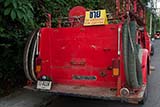 You have no excuses now and the next time you are looking around for an ancient Toyota fire engine (complete with hoses and rusty ladders), there will be no doubts which ones are for sale and which ones aren't.
You have no excuses now and the next time you are looking around for an ancient Toyota fire engine (complete with hoses and rusty ladders), there will be no doubts which ones are for sale and which ones aren't.
This level of written Thai is really easy and I realise that anyone with average intelligence who has been living in Thailand for six months or more will know it already. It's kids' stuff; the equivalent of learning cat and dog in English. I do plan to do some more advanced stuff soon but in order to make what I write useful, it's always useful to get some feedback.
More later ...
Monday 7th May 2007
Looking at the news headlines in Thailand this morning, it's the usual round up of death and disaster but a recurring theme is that many disasters seem to be self-inflicted.
Road accidents in Thailand are almost always caused by reckless driving or poor vehicle maintenance (or a combination of both). Since Songkran finished the road death figures have gone back to 'normal' but a high profile road death has just occurred, that of Nan province Deputy Governor, Prasert Leksakuldilok.
I haven't heard of any boating accidents for a while but what you usually discover shortly after the event is that the boat was overloaded and travelling too fast.
There was a big ammonia leak at a factory in Bangkok yesterday that made a lot of people ill. When I was working for Marconi many years ago, one job I did involved ammonia and it's a horrible substance to come into contact with.
The Nation's report suggests the leak was caused by a worn pipe and that it took three hours to find the right valve to turn off the flow of ammonia.
Last week, two people died and hundreds were made ill in Phayao province (more than one hundred people ended up in intensive care) after eating raw pork at a funeral. It was served up in a fiery Isaan dish known as laap where the meat is chopped very finely, and mixed with lemon juice and lots of chilies.
I thought it was a basic fact known to everyone on the planet that you never eat raw pork. It's not as if pork is an unusual dish in Thailand - the Thais eat loads of it - but as a result of stupidity, two people are dead and quite a few are probably still feeling the effects.
A month or two ago, thousands of fish were killed in the Chao Phrya river near Ayuthaya. The source was traced to a sunken barge that was carrying a cargo of sugar. From what I can make out, the barge sank as it tried to turn round in a strong current.
I wrote a piece a long time ago that I called 'Fate, Responsibility and Liability' to cover this kind of thing. Every day when I walk around, I see potential hazards caused by other people that I have to make sure I avoid.
For example, big holes in the pavement, blocked pavements that force me to walk in the road, open fires for cooking, metal poles sticking out at eye level, construction workers high up carelessly dropping building materials, exposed electricity cables, dangerous dogs not secured properly.
There is very little - if any - litigation in Thailand. The last thing I would want is an American-style litigation system but at least in the States, people are very careful about doing anything that could harm another person for fear of a huge lawsuit. That is not the case in Thailand.
With many people not seeming to have any responsibility for their actions, you have to watch out for yourself all the time. In some situations this is possible but obviously if you are working in a factory that uses ammonia, or travelling on a bus or in a boat, you have to rely on other people to act responsibly and if they don't, that's when the problems begin.
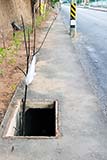 If it's not too wet or too hot, I walk to work and this is what I have to negotiate. A couple of months ago, several of the storm drain covers along this stretch of road disappeared.
If it's not too wet or too hot, I walk to work and this is what I have to negotiate. A couple of months ago, several of the storm drain covers along this stretch of road disappeared.
It's not really a problem. The holes are large and obvious and, additionally, some locals have thoughtfully placed dead branches in the holes as an added precaution.
However, all it would take is for two pretty Thai girls to ride by on a motorbike, thus disabling my normal brain functions for a few seconds, and such a distraction could cause disaster to strike.
Some other holes - especially at night in areas with poor street lighting - are not so easy to see. I mentioned this to my friend who is a councillor at the local municipality and she told me there is a big problem with theft.
I don't know if the thieves use them for a specific purpose or just sell them to scrap metal merchants. Perhaps some kind of locking system might be a good idea?
To put things in perspective a little, there was a traffic accident on the M25 motorway in England today that killed six people. It's a big story in the UK today.
Ch Supt Rob Price said the crash could be the most serious accident the Surrey force has had to deal with on the M25 since it opened in 1986.
Yes, in 21 years - in which time millions of cars have passed along that stretch of motorway - six people dying at once is the most serious accident ever to have taken place. In Thailand, that many people die on the roads every few hours, every day of the year and accidents involving only six people are nothing.
A few days ago I mentioned bad apples in Thai society and I've recently heard of two incidents involving mobile phone theft. There's not a lot of violent crime in Thailand but petty theft is quite widespread.
The girl who works at the restaurant I've been eating at a lot recently had her phone stolen on Saturday. A woman came in and ordered some food but then asked for it to be put in a container so she could take it home.
Porn, the waitress, went to the kitchen to do this but when she came back the woman was gone. So was her phone and her purse containing her ID card, driving licence and money. As we agreed, it's not so much the money but all the hassle of getting cards and stuff replaced.
My regular massage girl is back from Sukhothai after going back home for an extended Songkran break. She's a really sweet little thing; almost like a little ray of instant sunshine. She doesn't have an attitude like many of the other girls and her mood is always the same.
She's from a poor background; her parents are rice field workers and she has also worked in the rice fields in the past. I thought that snakes might be hazard but she told me the worst thing is the leeches.
Her family couldn't afford for her to finish her schooling so she left high school after year three to earn money to help support her family. Last week she started going back to school one day a week on Sundays to finish her high school education.
Before I met her I'd had a lot of problems with girls who weren't interested in the job. They just wanted to watch TV while performing a senseless kneading action on my legs without paying any attention to me.
She was different. She made no attempt to switch on the TV and she put a lot of effort into each massage. I kept going back to her and I tipped her well.
She had a very basic phone at first but had her eye on a new Nokia. She was patient, saving her money and eventually bought the phone she wanted. I was pleased for her when she got it because it made her happy and I had probably paid for it anyway in tips.
When I saw her today, she told me her phone had been stolen during her trip home. A pickpocket took it from her shoulder bag without her knowing. She now has another old one that can't play music or videos and doesn't have a camera.
For a poor girl, an Bt8000 phone is a lot of money and after she had saved up for so long it just seems really mean for someone to have stolen it.
Sunday 6th May 2007
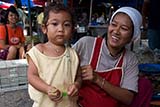 This site began purely as a result of my love and fascination for Thailand and a need to put my thoughts into print.
This site began purely as a result of my love and fascination for Thailand and a need to put my thoughts into print.
I'm not sure what I would have done 20 years ago before the Internet came into the public domain. Maybe I would have written a bad book to sit beside all the other bad books written about Thailand?
A lot of what I write is based on emotion because Thailand has that effect on me. I get more passionate about events in Thailand than I ever did about events in England. There are good reasons for this.
The Thais are a wonderful race of people. As is the case everywhere, there are bad apples, but I firmly believe that there is a higher ratio of good to bad people in Thailand than most other parts of the world. After having come into contact with lots of Thais and being shown so many acts of unselfish kindness it is difficult not to develop a deep affection for them.
At the same time, it is evident that life in Thailand isn't very equitable. Because of the way society is structured in Thailand, the majority of people have a pretty tough life. This is a relative term, of course, and the Thais are a lot better off than many Africans, Burmese, Laotians, Cambodians, Indians, Filipinos, etc. You will find Thais begging but you won't find any dying of starvation.
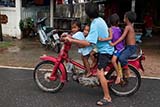 However, Thailand is not a poor country and what isn't right is the way the wealth is divided up, with some people being immensely rich while others lead drudge lives with no opportunities for any improvement. I'm not a socialist but the huge wealth gap just isn't right.
However, Thailand is not a poor country and what isn't right is the way the wealth is divided up, with some people being immensely rich while others lead drudge lives with no opportunities for any improvement. I'm not a socialist but the huge wealth gap just isn't right.
It is even worse when the rich people exploit the poor people and this is why I have such a big problem with Thaksin. I have never in my life felt the same way about any politician as I do about that man. I also feel strongly about certain foreigners who come to Thailand to exploit poor people.
It was never my intention to create a site that read like a boring list of facts and figures but writing with emotion and passion can be a dangerous thing because it can evoke strong emotions in other people.
I have received some criticism but actually I've received more positive comments than negative ones. I was thrilled this morning to open an e-mail with some positive comments about the site from none other than James Higbie, co-author (with Snea Thinsan) of the excellent 'Thai Reference Grammar - The Structure of Spoken Thai'.
If I was shipped off to a desert island and could only take one of my Thai language books with me, this would be it. It's a book that no one serious about learning the Thai language can afford to overlook.
Thanks James - you have really made my day!
Saturday 5th May 2007
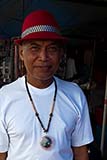 The Jatukham craze shows no sign of slowing up any time soon. Thailand's economy may be suffering as a whole but Nakhon Sri Thammarat hoteliers and purveyors of Jatukham Rammathep amulets (including lots of temples) are doing rather nicely at the moment.
The Jatukham craze shows no sign of slowing up any time soon. Thailand's economy may be suffering as a whole but Nakhon Sri Thammarat hoteliers and purveyors of Jatukham Rammathep amulets (including lots of temples) are doing rather nicely at the moment.
I have discovered that it's a great way to impress Thais because farangs aren't really supposed to know about such things. Just mention the word Jatukham when you see a big amulet hanging around someone's neck and instantly you have a new friend.
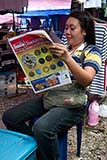 They will happily tell you where they bought it, how much it cost and how long they've owned it for. Asking if they believe in the Saksit powers that such amulets are reputed to have brings mixed responses.
They will happily tell you where they bought it, how much it cost and how long they've owned it for. Asking if they believe in the Saksit powers that such amulets are reputed to have brings mixed responses.
Not only are there shops selling Jatukham amulets everywhere now but there is lots of advertising and media being produced, ranging from advertising pamphlets and brochures to entire newspapers devoted to Jatukham.
The Jatukham phenomenon is not new but the current craze is fairly recent. I'm not sure why it has suddenly taken off but it could be because of all the political uncertainty in Thailand and the continuing problems in the south.
For a long time now the general political situation in Thailand has been unstable and perhaps people are looking for something to cling to give them hope and peace of mind?
It's a bad mistake to believe that everyone in the world thinks the same way. Two classic examples are current American foreign policy and foreign men who come looking for wives in Thailand. Even though we all look basically the same (two arms, two legs, one head, etc.) and our bodily functions are the same; the similarities stop there.
When I get the chance to speak with Thais who are fluent in English - which isn't very often - my questions are quite wide in nature and often relate to Thailand in a global sense. I am interested in the culture, Buddhism and other belief systems, politics, monarchy, etc. - not only as subjects in themselves but how they affect Thailand and its relations with other countries.
When Thais ask me questions, the questions are very different. They are normally of a very personal nature and many are based narrowly on a purely Thai perspective, indicating little knowledge of life outside Thailand.
In some ways this is understandable as the majority of Thais have never travelled outside Thailand. Even many of those who are now considered middle class have never left the country. However, there are other ways to find out about foreign countries other than actually visiting them.
I wrapped up the short English course I completed last week with an open question and answer session where anyone could ask anyone else any question. All the questions were directed at me and all were very personal.
"How old are you?" came first with both groups. It's an important piece of information in Thailand. "Are you married?" "Why not?" "Who do you live with?" "Do you have children?" "Why not?" "Do you like Thai girls?" "Can you eat Thai food?" "Do you like Thai people?" "Why not?" (They didn't realise that I was joking when I said no.)
This morning I went to one of the local markets with the owners of a nearby restaurant who have befriended me. On the way came more questions.
"Can you buy rice in England?" "What kind of rice?" Well, just .. erm .. rice - it comes in packets from Sainsburys. It's like me asking, "What different varieties of potato can you buy in Thailand?" Thais seem to have problems understanding that farangs have many kinds of different potato but only two kinds of banana - yellow and green ones.
"Is there enough rice for everyone to eat in England?" Er yes, but rice isn't the staple diet of farangs and we don't eat it at every meal.
Because something is perfectly normal in Thailand, there seems to be a problem understanding that other countries are not the same. Another question I like is, "What do you call som-tum in England, do you call it papaya pok-pok?"
Because som-tum is available on every street corner in Thailand, they don't seem to able to comprehend that it could possibly be unknown somewhere else and that most English people wouldn't have a clue what it is.
I don't know where the term papaya pok-pok came from. The Thais seem to think it is a recognised English noun. Then again, I am forever telling my students that 'sing-a-song' is not a verb. A few weird English-isms have entered the language and just stuck.
I don't have a TV but who needs one when you have Thais around? They are an endless source of amusement! Wonderful people.
 I am reminded often in Thailand by my students and friends (and I'm still not sure if they are joking or serious) that all farangs are rich and all Thais are poor - without any exceptions.
I am reminded often in Thailand by my students and friends (and I'm still not sure if they are joking or serious) that all farangs are rich and all Thais are poor - without any exceptions.
It brings tears to my eyes and I always make sure I drop a few satang in begging bowls. This fact also makes me feel better when I pay 10 times as much as a Thai person to enter a national park.
Some poor people, such as the owner of this piece of junk, can't even afford to ride in tuk-tuks like I can but somehow they manage to find cheap means of transport so they can get around. The poor Thais.
Friday 4th May 2007
The timing and venue for the latest meeting of the Intergovernmental Panel on Climate Change (IPCC) was quite appropriate. Most parts of Thailand - including Bangkok where the meeting was being held - have seen extremes of weather this year.
Hot season temperatures reached almost record levels in several parts of the country and last week a big depression arrived bringing the worst storms in almost 50 years. Severe weather warnings were first issued in the northern part of the peninsula before the storms moved north.
The south didn't escape. There was a big storm last night which brought the heaviest rain I have seen in a very long time, along with lightning and some deafening claps of thunder. It was very welcome.
Even though the wet weather ruined my trip last weekend, it is a relief to have some cooler weather at last. The farmers will also be relieved. There was no real rain to speak of during the last rainy season; no floods, and the klongs that sometimes overflow during the wet season remained almost bone dry.
With Thailand being a predominantly agricultural country employing 12 million people, and a big part of the economy relying on rice and fruit exports, droughts and other adverse weather that could potentially affect crops are very bad news.
 I've been to a few graduation ceremonies in Thailand; the last one being a couple of months ago and they are big events.
I've been to a few graduation ceremonies in Thailand; the last one being a couple of months ago and they are big events.
The last one was at a fairly small university but even so there were thousands of graduates. I wondered at the time how many graduates Thailand churns out each year.
The Nation published some interesting statistics today, one of which answered that question. This year there will be about 700,000 new graduates. A Bachelor's degree now is the minimum qualification required for even the most basic job so lots of students study for them.
The statistic looks good on paper but the reality is a little different.
Because a degree is required for every job advertised in Thailand, many students just go through the motions to get one, doing the least amount of work possible. Certainly, quite a few I've come across have been very lazy and wouldn't be able to compete with graduates from other countries.
The Nation's report says that many graduates will struggle to find work. There are many reasons for this. Of Thailand's 34 million workers, 12 million work in agriculture, six million in the industrial sector and the remainder in the service sector.
The industrial sector is experiencing a big downturn. The Nation cites, "rising oil prices, political instability and an economic downwards trend," but doesn't mention competition from other developing countries.
The Thai work ethic - generally speaking - is just to do enough. Thailand is an abundant land, rich in natural resources, so there has never been any reason to do any more than is absolutely necessary but that is not the case in a competitive, globalised world.
The country has also lost out in a big way to the lucrative software services and call centre markets that have sprung up in countries such as India, Malaysia and the Philippines. The reason for this is that few Thais have the sufficient English language skills; which is another big problem for the country.
 As in other countries, there are significant numbers of students doing useless degrees. Again, from The Nation, "About 300,000 are completing bachelor's degrees and who are considered unskilled labour."
As in other countries, there are significant numbers of students doing useless degrees. Again, from The Nation, "About 300,000 are completing bachelor's degrees and who are considered unskilled labour."
Before I start to give the wrong impression, there are some extremely bright students in Thailand; in particular, those choosing to study beyond the minimum Bachelor's degree level. Palm, the girl who was helping me with my Thai before she went off to Bangkok to do a Master's degree, has a planet-sized brain and she is not alone.
However, students like this tend to be the exception and quite a few end up abroad where they can better fulfil their potential.
I don't see much evidence of Thailand having a vision of the future at the moment which is not good for the Thais or for foreign investors. Foreign investors are actually very wary of Thailand at the moment. A friend of mine working in investment in London sees Thailand and Thai government policy as interesting but, in his words, eccentric.
I hate giving any credit whatsoever to Thaksin but he at least talked about vision. Unfortunately, with Thaksin he always had his own agenda and never spoke the truth. His vision to turn Thailand into the main transport hub of Southeast Asia was really about building a huge airport so that he and his cronies could get very rich handing out contracts and receiving huge backhanders in return. What is desperately needed is visionary leaders who are not corrupt but ... this is Thailand.
The obsession with money and short-term gain are problems in Thailand. When Lee Kuan Yew started to draw up his blueprint to transform Singapore from a primitive, swampy backwater into one of the leading countries in the developed world, he understood that it would take a long time to reap the benefits.
Thailand doesn't seem to understand this. There are some signs that corruption is being stamped out but will it ever go away? How many times will exciting projects fail because the people in charge are only interested in benefiting themselves?
The unwritten and unmentioned caste system that exists is another problem. When will we begin to see some genuine long-term investment in education and industry in the northeast instead of just Bangkok and when will Thailand start looking at its poorest inhabitants in any other way than just a source of cheap labour to line the pockets of rich Thai businessmen?
 The environment is another issue. In the same week that someone was telling me how beautiful Bangsaphan was in Prachuap Kirikhan province, I heard from another person that there is a major environmental issue going on there at the moment.
The environment is another issue. In the same week that someone was telling me how beautiful Bangsaphan was in Prachuap Kirikhan province, I heard from another person that there is a major environmental issue going on there at the moment.
There is an important wetlands area in Bangsaphan that is under threat from some kind of an industrial factory. The Thai government requested that an Environmental Impact Assessment (EIA) be carried out but I was told that money had been exchanged to influence the report. How Thai.
I don't know enough about the details to add any comments of my own but from what I have observed in the past in beautiful natural areas of Thailand, the Thais don't hang around with the bulldozers if there is some quick money to be made.
They don't seem to realise that the natural beauty is why people visit in the first place and that by destroying it, they destroy their number one asset. Once it's gone, it's gone.
A lot of what Thailand does is good and I'm certainly not critical of everything (I think the stance Thailand is currently taking against fat-cat American pharmaceutical companies is great) but the country is at a very interesting point at the moment and the government has no end of challenges to face. At some stage Thailand will have to try to break away from Thai culture and face up to reality.
In the land of face and image it's all very well having fancy graduation ceremonies all over the country and boasting at how many graduates the country turns out each year but if they can't speak English to a reasonable level, half of them are unemployable and the rest can't find jobs, what is the point?
Of course, there will always be the easy option for Thai girls to make reasonable amounts of money as long as they are young and attractive but is this what Thailand really wants?
Thursday 3rd May 2007
I now have three jobs and considering that when I came to Thailand I had no intention of working, I could ask myself, "What went wrong?" Nothing really; it's just how things have worked out.
My first job in Thailand was a nightmare but then I managed to find some good work. During that time, the immigration rules tightened up and work took on an increased significance. Having a formal, signed contract with lots of rubber stamps and important signatories was the key to securing my work permit and visa in order to stay in the country.
When, a month or two ago, I started to sense that my contract wouldn't be extended again next year I started to look around for more work. I got a few leads but nothing solid.
One place then asked me to run a short course so they could take a look at me. I finished that today, got on very well with the students, and now they want me to continue. Another place has also asked me to start working. Meanwhile I still have my original job. Because none of the times overlap, I have managed to fit all three into three days so that I still get four days off.
Those three days will be tiring but at least I will have four off to recover and plan lessons. All three jobs pay very well (for Thailand). A few years ago I couldn't break through the Bt300 an hour barrier but now I have exceeded that by a long way.
The money isn't essential but it all helps and for the first time since I got here I will actually be able to live on what I earn in Thailand without using any of my income from abroad. Without knowing what the future might have in store, it's always good to stockpile some cash.
The last few weeks - doing two of the three jobs - have been busy and tiring but I've also enjoyed that time very much. Some of my worst times in Thailand have been when I've had nothing to do. Since giving up my old existence, life has been a voyage of discovery.
One of the things I have realised is that I do not function well with nothing to do. I can find things to do but finding the motivation to do them isn't always easy. Having work solves that problem. People have been known to go completely off the rails in Thailand with too much time on their hands.
It's an easy country to get through a lot of money and to get into trouble. "Idle hands are the devil's tools," so the proverb goes. After moving to Thailand, there is lots to do, see and learn in the first year or two but after that it's probably a good think to think about what you will do after that.
Knowing yourself is very important. If you are genuinely happy doing nothing, then it's not a problem but if you are an active person, it could be. The worst thing you could do to me is stick me on a beach in Thailand with nothing to do. It wouldn't matter how beautiful the beach was, I would be tearing my hair out within about two hours.
Wednesday 2nd May 2007
Beauty (the subject of today's blog) is highly prized in Thailand but sometimes the Thais go a little too far.
Iss went to visit a friend who is in hospital at the moment. It's not the same hospital as she uses and even though both are private and fairly similar she was telling me that the one she uses is much better. Why did she think this?
Had her friend been suffering from poor nursing aftercare? Did she get a bad diagnosis or, perhaps, even worse did she wake up half way through an operation?
If you answered '(E)None of the above' you are correct. On Iss's visit she noticed that the nurses weren't as beautiful as the ones at her hospital, nor were the doctors as handsome. She was deathly serious about all this. Her opinion of a hospital was based purely on the physical attractiveness of the people that worked there.
I bought some new shirts for work recently that are quite smart and when I wear them it isn't unusual to receive lots of compliments and even for girls to gawk at me. It's certainly good for the ego. Compared to when I'm in my usual farang kee-ngok clothes, I get treated completely differently but I'm still the same person.
So, you want to teach English in Thailand? Forget about paying out for an expensive TEFL course; just invest in a new wardrobe. I was going to say plastic surgery as well but it really isn't necessary. Regardless of what clothes I'm wearing, I can't do much about my ugly head but it doesn't seem to matter.
It's strange how someone can be seen as very beautiful or handsome based purely on the clothes they are wearing but that's how the Thais seem to be.
Thai ideals of beauty are quite different to my own. Often, Thai people will remark how beautiful a girl is when I don't think she is at all beautiful and some of the most beautiful, natural looking girls I have seen are considered 'plain Janes' by the Thais.
At one beauty contest I watched, I saw very few girls who I considered were beautiful. They weren't ugly but they weren't that great either. Most were very tall and whenever I see a very tall girl in Thailand I immediately suspect that she may not actually be a girl.
The winner of the contest was staying at the same hotel as me and I got the chance to chat to her later. Even close up, I thought she might be a katoey. She probably wondered why I kept staring at her neck; not knowing I was trying to see if she had an Adam's Apple.
On the subject of beauty contests, there is absolutely no political correctness in Thailand and they are very popular. On the university notice boards I have seen the winners of the Miss and Mr Freshy (1st year students) beauty contests.
Beauty in Thailand is not something to be ashamed about. Beautiful people are held in great esteem and paraded around at every opportunity. One of the secretaries at work is a very pretty girl with a classically Thai look. Whenever the department is participating in any kind of public function, she is pushed to the front to be shown to the world.
Thai girls rarely think they are beautiful themselves and I think this is genuine rather than being modest or fishing for comments. Some obviously do but many don't. They like to find beauty in other people rather than pushing their own beauty.
This obsession with beauty can seem a little strange to foreigners (at least it did to me) but after a while you get used to it. If teaching groups of women don't be surprised if instead of being asked about their ability in English, you are asked which one you think is the most beautiful.
How much more enjoyable my working life would have been back in England had the Brits been similarly minded. Some of the female project managers I had to work for were hideously ugly inside and out. I think I would have been a lot more productive and cooperative had I been working for a silky-haired, Thai beauty and I wouldn't have cared less if she knew what a Gantt chart was or not.
Tuesday 1st May 2007
Should a country that has just been voted the world's number one travel destination really need to be hiring an American PR company to improve its image at the same time?
Welcome to confusing Thailand; the Land of Contradictions. Once you start to get your head around the culture, what was once confusing starts to become a little clearer. It takes a while to figure out though.
Culture is very interesting and very powerful. Thailand prides itself on never having been colonised but by never having a colonial master the culture has remained undiluted. It's interesting speaking with Malaysians about why they think their economy is strong.
They cite Mahathir (the controversial ex-Prime Minister) as one reason but they are also very proud of the British heritage they acquired as a result of being colonised.
Singaporeans, of course, will point to Lee Kuan Yew as the founding father of modern-day Singapore but LKY was very influenced by the British and Singaporeans do not underestimate the influence of former British colonialism. Gunboat diplomacy wasn't always very equitable or just but there were certain benefits.
In Singapore and Malaysia there is a British sense of fair-play that doesn't necessarily exist in Thailand's strictly hierarchical society.
What happens in a country where anyone who gets into a position of power and governance feels they have the right to help themselves to as much as they want? Gin muang (eating the city) describes this part of Thai culture. Elsewhere it's known as corruption.
King Rama V tried to stamp it out but culture doesn't change overnight and many of the problems we have seen with Thai politicians in recent years can be traced back to gin muang. It's cultural. The Thais had to borrow the word 'corruption' from the English language because such a concept didn't exist. It can't exist if it is known as something else and that something else is an acceptable part of the culture.
Looking the other way at undesirable aspects of society is another cultural trait. When a dictionary was published that described Bangkok as being a city with a lot of prostitution the Thais were furious because it is an aspect of the country they feel ashamed about.
However, by just looking the other way and not acting, it makes Thailand seem confusing to visitors. When tourists spend two weeks in Phuket or Pattaya many of them come away with an impression of Thailand that couldn't be any further from the truth but it's not their fault.
There are aspects of Thai culture that are wonderful (and which other countries should try to adopt) but the culture can also be confusing and send out mixed messages. Thailand is suffering economically at the moment and it shouldn't be because in many respects it is a rich country.
The country is currently seen as being 'inward looking' and not open enough to foreign investment. Vietnam, on the other hand, is streaking ahead at the moment.
Hiring some American spin doctors is one solution (it seems to be the solution to every problem these days) but for Thailand to really push ahead into the developed world, there needs to be a few huge cultural shifts and that won't be easy.


